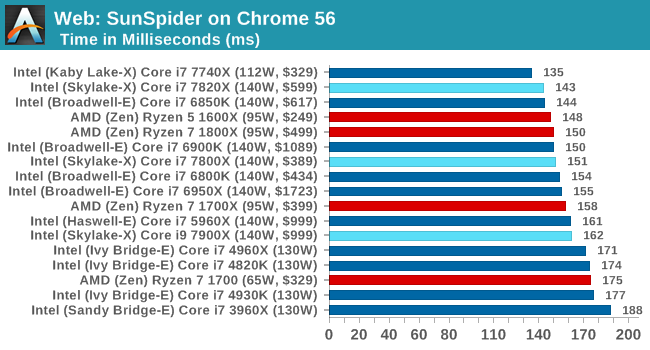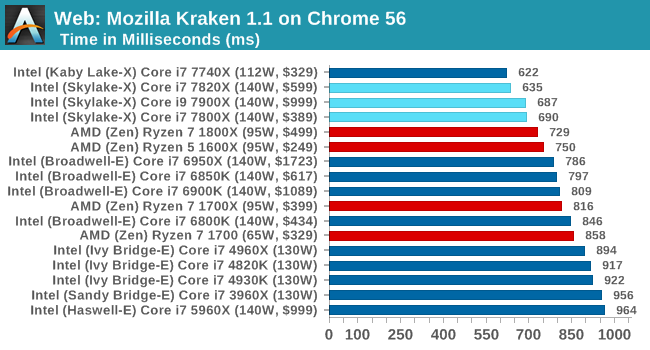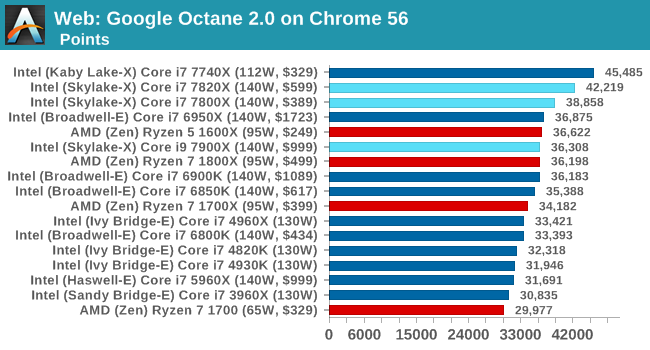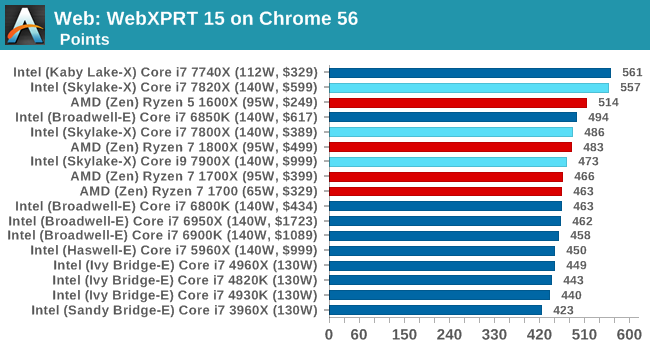The Intel Skylake-X Review: Core i9 7900X, i7 7820X and i7 7800X Tested
by Ian Cutress on June 19, 2017 9:01 AM ESTBenchmarking Performance: CPU Web Tests
One of the issues when running web-based tests is the nature of modern browsers to automatically install updates. This means any sustained period of benchmarking will invariably fall foul of the 'it's updated beyond the state of comparison' rule, especially when browsers will update if you give them half a second to think about it. Despite this, we were able to find a series of commands to create an un-updatable version of Chrome 56 for our 2017 test suite. While this means we might not be on the bleeding edge of the latest browser, it makes the scores between CPUs comparable.
SunSpider 1.0.2
The oldest web-based benchmark in this portion of our test is SunSpider. This is a very basic javascript algorithm tool, and ends up being more a measure of IPC and latency than anything else, with most high-performance CPUs scoring around about the same. The basic test is looped 10 times and the average taken. We run the basic test 4 times.

Sunspider goes after peak frequency most of the time, althoguh there is some variation as it moves into basically becoming a legacy test.
Mozilla Kraken 1.1
Kraken is another Javascript based benchmark, using the same test harness as SunSpider, but focusing on more stringent real-world use cases and libraries, such as audio processing and image filters. Again, the basic test is looped ten times, and we run the basic test four times.

Kraken is more of an intense attack on JS, and still regularly sorts by IPC and frequency.
Google Octane 2.0
Along with Mozilla, as Google is a major browser developer, having peak JS performance is typically a critical asset when comparing against the other OS developers. In the same way that SunSpider is a very early JS benchmark, and Kraken is a bit newer, Octane aims to be more relevant to real workloads, especially in power constrained devices such as smartphones and tablets.

Octane seems to be an optimization target, and with the new Skylake-X it shows.
WebXPRT 2015
While the previous three benchmarks do calculations in the background and represent a score, WebXPRT is designed to be a better interpretation of visual workloads that a professional user might have, such as browser based applications, graphing, image editing, sort/analysis, scientific analysis and financial tools.











264 Comments
View All Comments
Gothmoth - Tuesday, June 20, 2017 - link
especially in the powerdraw and heat class it dominates even my oven....AntDX316 - Tuesday, June 20, 2017 - link
The new processors are in totally another level/league/class. It dominates in everything and more except a couple benches. If you try to compare by price you can't. It would make no sense.Gothmoth - Tuesday, June 20, 2017 - link
it makes sense.. for everyone except stupid fanboys.Hxx - Tuesday, June 20, 2017 - link
so people are getting pissed because these CPUs perform well albet at a much higher price tag. Sounds like a bunch of AMD fanboys.Its new tech, highest performing, and serving a very niche market. Of course is at a premium price. why wouldn't it be? Luckily, these are not needed for the majority so I am not sure why people get so worked up about it. If you want intel then 7700k is a fantasic $300 CPU. If you want AMD then again the 1700 is also a fantastic CPU. end of story
Gothmoth - Tuesday, June 20, 2017 - link
i personally don´t care about price... my PC´s earn the money back i spend.but saying we can´t compare price/performance form skylake-x and ryzen is just plain stupid.
of course we can.
and we can also compare price/performance when threadripper is released... the real competition to x299.
Gothmoth - Tuesday, June 20, 2017 - link
by the way.. what about the RUMORS that coffee lake will be 6 cores... but no hyperthreading?that would be EXACVTLY what i expect from intel.
Intredpid3d - Tuesday, June 20, 2017 - link
Why did you use Intel's compiler for your reviews? with all the other compilers out there that work beautifully with Ryzen why did you use the one that is known to be deliberately coded to work very badly on anything other than its creators products, Intel.?
johnp_ - Tuesday, June 20, 2017 - link
Were did they use Intel's icc? The Chromium compile test was done using VS Community 2015.3.tamalero - Tuesday, June 20, 2017 - link
Thats the interesting thing, in a lot of reviews online.. there are 3 variations of the same test.1) stock I9 7900
2) optimized compiler I9 7900
3) Oced I9 7900
the optimized one yields like 10% higher on average more performance.
johnp_ - Tuesday, June 20, 2017 - link
2) is not possibly for a Chromium compile test, as that has a hard dependency on Visual Studio 2015 U3 and 3) first requires overclocking, for which they didn't have enough time yet.Regarding higher performance, I expect you mean compiled programs reaching higher performance and not the compilation process requiring less time (which is what anandtech measures here and that's the relevant bit for developers).